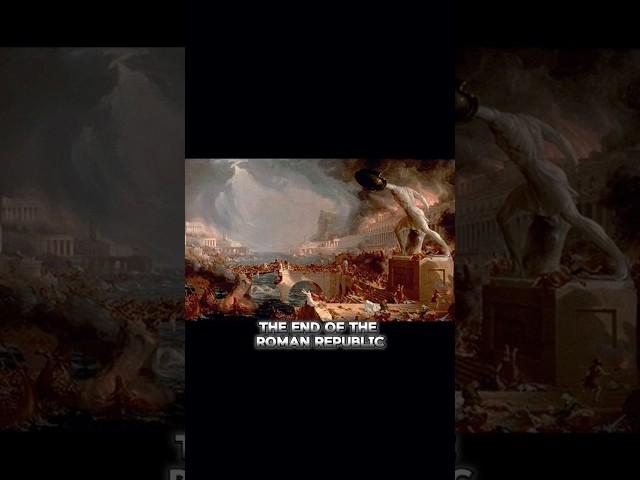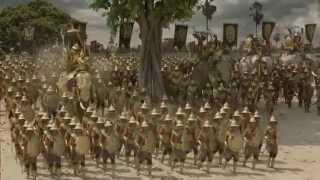
End of the Roman Republic: From Democracy to Empire. #RomanHistory #JuliusCaesar #AncientRome
The End of the Roman Republic: A Turning Point in History
The fall of the Roman Republic was a transformative period marked by political turmoil, civil wars, and the rise of autocratic rule, which ultimately led to the establishment of the Roman Empire. This dramatic shift in governance reshaped Rome and left an indelible mark on world history.
The Republic, established in 509 BCE, was characterized by a complex system of checks and balances, with power distributed among elected officials, including the Senate and popular assemblies. However, by the 1st century BCE, the Republic was in crisis. The increasing power of military generals, social inequality, and political corruption eroded traditional Republican values.
One of the pivotal figures in this period was Julius Caesar. A brilliant general and politician, Caesar formed the First Triumvirate with Pompey and Crassus, an alliance that dominated Roman politics. However, their partnership deteriorated, leading to a civil war between Caesar and Pompey. Caesar's victory and subsequent appointment as dictator for life in 44 BCE alarmed many who feared the end of the Republic.
Caesar's assassination on the Ides of March, 44 BCE, by a group of senators including Brutus and Cassius, was an attempt to restore the Republic. Instead, it plunged Rome into further chaos. The power struggle that ensued involved Caesar's allies and opponents, leading to another round of civil wars.
Out of this turmoil emerged Caesar's adopted heir, Octavian (later known as Augustus), and his rival, Mark Antony. Their conflict culminated in the Battle of Actium in 31 BCE, where Octavian decisively defeated Antony and his ally, Cleopatra. Octavian’s victory marked the end of the Roman Republic and the beginning of the Roman Empire.
In 27 BCE, Octavian was granted the title Augustus by the Senate, symbolizing his supreme authority. This marked the official end of the Republic and the start of an era where emperors wielded ultimate power. The Senate continued to exist but with significantly reduced influence, as Augustus and his successors centralized authority.
The transition from Republic to Empire had profound impacts on Roman society and governance. It stabilized a state that had been wracked by internal conflict, allowing for an era of relative peace and prosperity known as the Pax Romana. However, it also marked the end of a system where power was shared among elected officials, shifting Rome towards a model of imperial rule that would last for centuries.
The legacy of the Roman Republic’s fall is complex. It serves as a powerful reminder of how internal divisions and the concentration of power can undermine democratic institutions. The stories of key figures like Julius Caesar, Augustus, and the senators who opposed them continue to captivate historians and the public alike.
By studying this pivotal era, we gain insights into the dynamics of political power, the challenges of governance, and the factors that can lead to the rise and fall of great civilizations.
#RomanRepublic #AncientRome #JuliusCaesar #Augustus #RomanEmpire #History #AncientHistory #PoliticalHistory #CivilWars #PaxRomana #EndOfAnEra #HistoricalFigures #RepublicToEmpire #WorldHistory #LegacyOfRome
Beard, Mary. SPQR: A History of Ancient Rome. Liveright, 2015.
Goldsworthy, Adrian. Caesar: Life of a Colossus. Yale University Press, 2006.
Everitt, Anthony. Augustus: The Life of Rome's First Emperor. Random House, 2006.
Syme, Ronald. The Roman Revolution. Oxford University Press, 1939.
Holland, Tom. Rubicon: The Last Years of the Roman Republic. Anchor, 2005.
Plutarch. Lives of the Noble Grecians and Romans. Various editions.
Appian. The Civil Wars. Penguin Classics, various editions.
Suetonius. The Twelve Caesars. Penguin Classics, various editions.
Cicero. Letters and Speeches. Various collections and editions.
Cassius Dio. Roman History. Loeb Classical Library, various editions.
These sources provide a comprehensive look at the political, social, and military factors that contributed to the end of the Roman Republic and the rise of the Roman Empire.
The fall of the Roman Republic was a transformative period marked by political turmoil, civil wars, and the rise of autocratic rule, which ultimately led to the establishment of the Roman Empire. This dramatic shift in governance reshaped Rome and left an indelible mark on world history.
The Republic, established in 509 BCE, was characterized by a complex system of checks and balances, with power distributed among elected officials, including the Senate and popular assemblies. However, by the 1st century BCE, the Republic was in crisis. The increasing power of military generals, social inequality, and political corruption eroded traditional Republican values.
One of the pivotal figures in this period was Julius Caesar. A brilliant general and politician, Caesar formed the First Triumvirate with Pompey and Crassus, an alliance that dominated Roman politics. However, their partnership deteriorated, leading to a civil war between Caesar and Pompey. Caesar's victory and subsequent appointment as dictator for life in 44 BCE alarmed many who feared the end of the Republic.
Caesar's assassination on the Ides of March, 44 BCE, by a group of senators including Brutus and Cassius, was an attempt to restore the Republic. Instead, it plunged Rome into further chaos. The power struggle that ensued involved Caesar's allies and opponents, leading to another round of civil wars.
Out of this turmoil emerged Caesar's adopted heir, Octavian (later known as Augustus), and his rival, Mark Antony. Their conflict culminated in the Battle of Actium in 31 BCE, where Octavian decisively defeated Antony and his ally, Cleopatra. Octavian’s victory marked the end of the Roman Republic and the beginning of the Roman Empire.
In 27 BCE, Octavian was granted the title Augustus by the Senate, symbolizing his supreme authority. This marked the official end of the Republic and the start of an era where emperors wielded ultimate power. The Senate continued to exist but with significantly reduced influence, as Augustus and his successors centralized authority.
The transition from Republic to Empire had profound impacts on Roman society and governance. It stabilized a state that had been wracked by internal conflict, allowing for an era of relative peace and prosperity known as the Pax Romana. However, it also marked the end of a system where power was shared among elected officials, shifting Rome towards a model of imperial rule that would last for centuries.
The legacy of the Roman Republic’s fall is complex. It serves as a powerful reminder of how internal divisions and the concentration of power can undermine democratic institutions. The stories of key figures like Julius Caesar, Augustus, and the senators who opposed them continue to captivate historians and the public alike.
By studying this pivotal era, we gain insights into the dynamics of political power, the challenges of governance, and the factors that can lead to the rise and fall of great civilizations.
#RomanRepublic #AncientRome #JuliusCaesar #Augustus #RomanEmpire #History #AncientHistory #PoliticalHistory #CivilWars #PaxRomana #EndOfAnEra #HistoricalFigures #RepublicToEmpire #WorldHistory #LegacyOfRome
Beard, Mary. SPQR: A History of Ancient Rome. Liveright, 2015.
Goldsworthy, Adrian. Caesar: Life of a Colossus. Yale University Press, 2006.
Everitt, Anthony. Augustus: The Life of Rome's First Emperor. Random House, 2006.
Syme, Ronald. The Roman Revolution. Oxford University Press, 1939.
Holland, Tom. Rubicon: The Last Years of the Roman Republic. Anchor, 2005.
Plutarch. Lives of the Noble Grecians and Romans. Various editions.
Appian. The Civil Wars. Penguin Classics, various editions.
Suetonius. The Twelve Caesars. Penguin Classics, various editions.
Cicero. Letters and Speeches. Various collections and editions.
Cassius Dio. Roman History. Loeb Classical Library, various editions.
These sources provide a comprehensive look at the political, social, and military factors that contributed to the end of the Roman Republic and the rise of the Roman Empire.
Тэги:
#End_of_Roman_Republic #Julius_Caesar #Roman_Empire #Augustus #Roman_civil_wars #Fall_of_Roman_Republic #Ancient_Rome #Roman_history #Roman_Senate #First_Triumvirate #Roman_Empire_transition #Ides_of_March #Battle_of_Actium #Roman_Senate_collapseКомментарии:
End of the Roman Republic: From Democracy to Empire. #RomanHistory #JuliusCaesar #AncientRome
HistoriSci Perspectives
Crane Rigger Training ️| Lifting Operation | Safety Rules
OPERATOR & RIGGER GROUP
푸콘가족 더빙(쌍둥이 편)
홍이임다
Jharkhand Idol Grand Finale & Jhollywood Award Show | SYFT Global Events
SYFT GLOBAL Events
Ranking Countries Based on Their Food
MaskedArab
Living in Buford, GA: Pros and Cons
Moving to Georgia
เพลง พระนเรศรมหาราช
Panuponng Ponchai
Trivia challenge for you! #quiz #trivia
The Trivia Hub


























